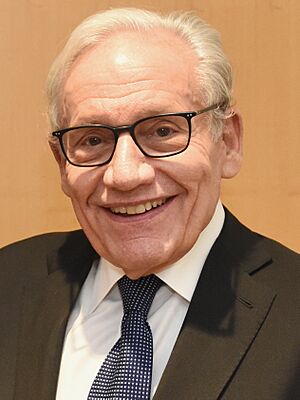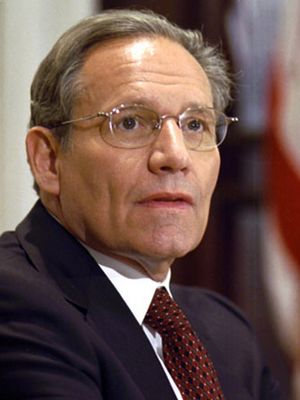Bob Woodward facts for kids
Quick facts for kids
Bob Woodward
|
|
|---|---|

Woodward in 2023
|
|
| Born |
Robert Upshur Woodward
March 26, 1943 Geneva, Illinois, U.S.
|
| Education | Yale University (BA) |
| Occupation | Journalist |
| Known for | Reporting on the Watergate scandal |
|
Notable credit(s)
|
The Washington Post |
| Spouse(s) |
Kathleen Middlekauff
(m. 1966; div. 1969)Frances Kuper
(m. 1974; div. 1979)Elsa Walsh
(m. 1989) |
| Children | 2 |
| Parent(s) |
|
| Military career | |
| Allegiance | |
| Service/ |
|
| Years of service | 1965–1970 |
| Rank | |
| Unit | USS Wright (CVL-49) USS Fox (CG-33) |
Robert Upshur Woodward (born March 26, 1943) is a famous American investigative journalist. He began working for The Washington Post newspaper in 1971. He is now an associate editor there, even though he is no longer a full-time employee.
In 1972, while at The Washington Post, Woodward worked with Carl Bernstein. They reported on the Watergate scandal. Their reporting led to many government investigations. It also led to President Richard Nixon resigning from office. Another journalist, Gene Roberts, called their work "maybe the single greatest reporting effort of all time."
Woodward continued to work for The Washington Post after Watergate. Since 1974, he has written 21 books about American politics. Fourteen of these books became best-sellers.
Contents
Woodward was born in Geneva, Illinois. His father, Alfred E. Woodward, was a lawyer who became a chief judge. Bob grew up in Wheaton, Illinois, and went to Wheaton Community High School. His parents divorced when he was twelve. He and his siblings were raised by their father.
After high school in 1961, Woodward went to Yale University. He studied history and English literature. He was part of the Naval Reserve Officers Training Corps (NROTC) program. He earned his bachelor's degree in 1965.
After Yale, Woodward served five years in the United States Navy. He worked as a communications officer. He served on the USS Wright. He was one of two officers who handled nuclear launch codes on the Wright. He also served on the USS Fox.
Journalism Career Highlights
Starting as a Reporter
Woodward left the Navy in August 1970. He applied for a job at The Washington Post. The editor, Harry M. Rosenfeld, gave him a two-week trial. However, he was not hired at first because he lacked experience. After working for a year at a weekly newspaper, Woodward joined the Post in 1971.
Investigating Watergate
Woodward and Carl Bernstein were assigned to cover a break-in. This happened on June 17, 1972, at the Democratic National Committee headquarters. It was in a building called Watergate. Their reporting, guided by editor Ben Bradlee, uncovered many political "dirty tricks." These tricks were used by President Nixon's re-election team.
Their book about the scandal, All the President's Men, became a huge success. It was later made into a movie in 1976. The film starred Robert Redford as Woodward and Dustin Hoffman as Bernstein. This movie made the reporters famous. It also inspired many people to become investigative journalists.
The book and movie also created a mystery. This was the identity of Woodward's secret Watergate informant. ..... For over 30 years, only a few people knew who he was. In May 2005, his family revealed he was W. Mark Felt. Felt was a former Associate Director of the Federal Bureau of Investigation. Woodward quickly confirmed this. He then wrote a book, The Secret Man, about his relationship with Felt.
Woodward and Bernstein wrote a second book about Watergate. It was called The Final Days (published in 1976). This book covered the time from November 1973 until President Nixon resigned.
The "Jimmy's World" Story
In September 1980, a story called "Jimmy's World" appeared in the Post. Reporter Janet Cooke wrote about an eight-year-old. Some at the Post doubted if the story was true. But editors, including Woodward, defended it. Woodward even submitted the story for a Pulitzer Prize. Cooke won the prize on April 13, 1981. Later, the story was found to be completely made up. The Pulitzer Prize was returned.
Woodward later said, "I was blown away by the story." He added that winning the prize was not as important as the story itself. He called it "a brilliant story—fake and fraud that it is."
Reporting on the Bush Administration
Woodward spent a lot of time with former President George W. Bush. He interviewed him six times for about 11 hours. Woodward wrote four books about the Bush presidency. These books covered the response to the September 11 attacks. They also detailed the wars in Afghanistan and Iraq.
In 2008, Woodward mentioned he was working on a fourth book in his Bush at War series.
Information Leak Incident
In November 2005, Woodward testified about an information leak. He said a senior government official told him in June 2003 about Joe Wilson's wife. She worked for the CIA as an analyst. Woodward was one of the first reporters to learn this from a government source. He said the information was given casually. He did not think it was meant to reveal her identity.
Later, Woodward's source was identified as Richard Armitage. Armitage was Colin Powell's deputy. Woodward apologized to his editor for not sharing this information sooner.
Other Activities
Woodward continues to write books and report for The Washington Post. He holds the title of associate editor. He focuses on the presidency, intelligence, and important Washington groups. These include the U.S. Supreme Court and The Pentagon.
Awards and Recognition
Woodward helped The Washington Post win two Pulitzer Prizes. First, he and Bernstein were key reporters for the Watergate coverage. The Post won the Pulitzer Prize for Public Service in 1973. He was also a main reporter for the Post's coverage of the September 11 attacks in 2001. The Post won the 2002 Pulitzer Prize for National Reporting for these stories.
Woodward has received many major American journalism awards himself. These include the Heywood Broun award (1972) and the George Polk Award (1972). In 2012, Colby College gave him the Elijah Parish Lovejoy Award for brave journalism.
He has written or co-written 21 non-fiction books. All of them have been national bestsellers. Fourteen of them reached No. 1 on the national non-fiction bestsellers list. This is more than any other modern author in this type of writing.
Former Post Executive Editor Ben Bradlee praised Woodward in his 1995 memoir. He called Woodward "surely the best of his generation at investigative reporting." He added, "Woodward has maintained the same position on top of journalism's ladder ever since Watergate."
David Gergen, who worked in the White House, said Woodward's accounts are "remarkably reliable." He believed Woodward writes only what he thinks is true.
In 2001, Woodward won the Walter Cronkite Award for Excellence in Journalism.
Many other journalists have praised Woodward. Fred Barnes called him "the best pure reporter of his generation." In 2004, Bob Schieffer said, "Woodward has established himself as the best reporter of our time."
In 2014, Robert Gates, a former CIA director, said he wished he had recruited Woodward into the CIA. He said Woodward has "an extraordinary ability to get otherwise responsible adults to spill [their] guts to him."
Public Speaking
Woodward often gives speeches at colleges and universities. He spoke at Central Connecticut State University in 2001. He has also spoken at the University of Arkansas and University of Alabama.
In May 2019, he gave a speech at Kent State University. He revealed a previously unheard audiotape. On the tape, then-President Richard Nixon praised the 1970 shooting of four students. Nixon believed it affected those who disagreed with him.
Personal Life
Woodward has been married three times. His first marriage was to Kathleen Middlekauff (1966–1969). His second marriage was to Frances Kuper (1974–1979). In 1989, he married Elsa Walsh. She is a writer for The New Yorker.
His oldest daughter, Tali, is also a journalist. She worked as an editor for The Trace.
Television Work
Woodward helped write the 1986 NBC TV film Under Siege. This movie was about terrorist attacks in the United States.
He also worked on the 1989 TNT TV miniseries based on The Nightmare Years. This miniseries was about American journalist William L. Shirer in pre-World War II Nazi Germany.
See also
 In Spanish: Bob Woodward para niños
In Spanish: Bob Woodward para niños
 | Kyle Baker |
 | Joseph Yoakum |
 | Laura Wheeler Waring |
 | Henry Ossawa Tanner |


